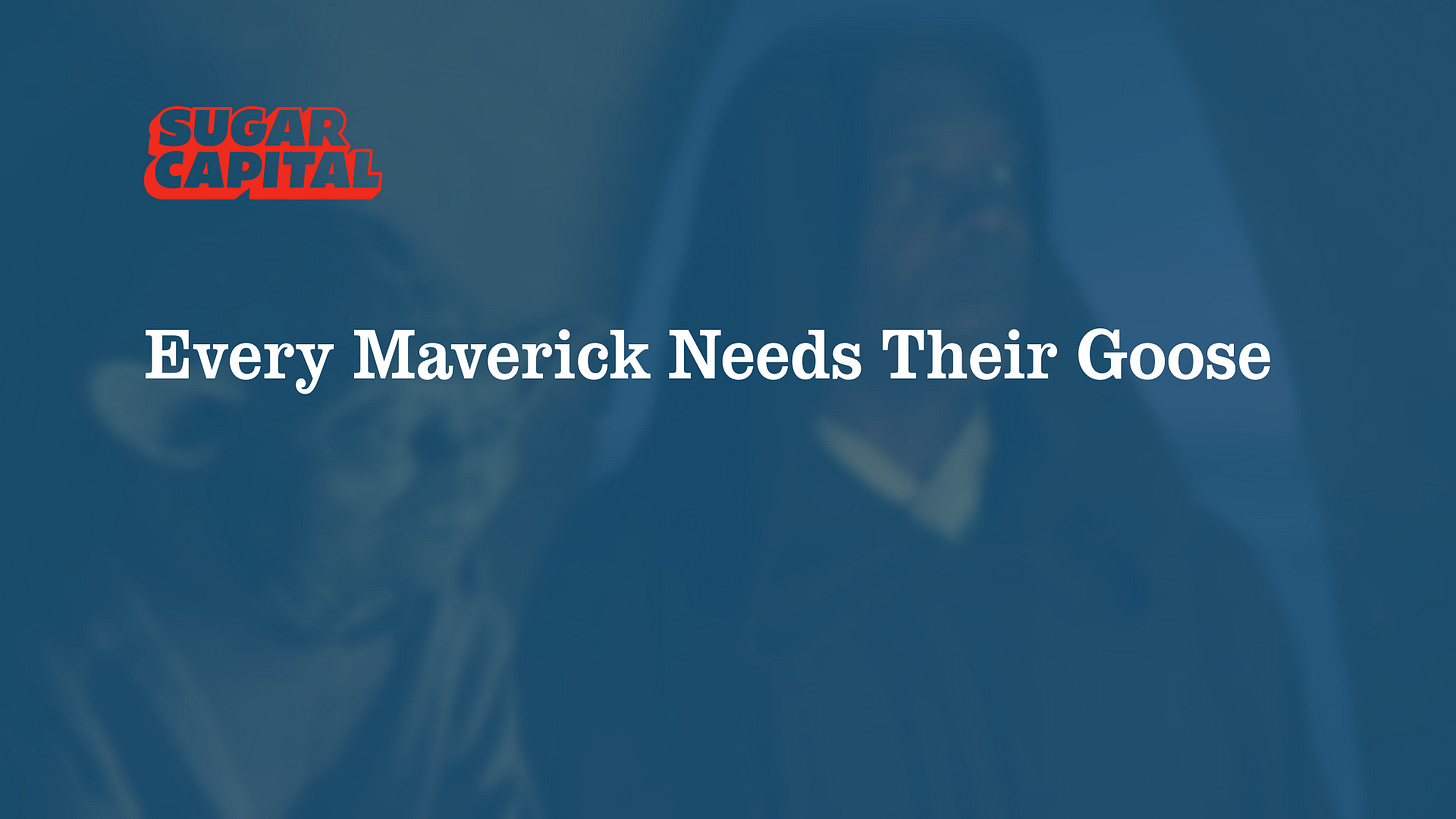Every Maverick Needs Their Goose
Legendary companies use both sides of their brain.
“Always two there are, no more, no less.” — Yoda, Star Wars: Episode I, The Phantom Menace (1999)
After 25 years building companies and 5 years funding them, I've noticed something: the biggest successes rarely come from single founders. They come from dynamic duos - pairs of people who think completely differently but want the same thing.

Think Maverick and Goose. The hotshot pilot had killer instinct, but his Radar Intercept Officer (RIO) managed systems, watched for threats, and kept them both alive. Maverick could fly, but Goose made him flyable. When they worked in sync, they were unbeatable. When Goose died, Maverick didn't just lose a partner - he lost his edge.
Every successful founder I've worked alongside, whether as a co-founder or investor, has found their Goose. The best ones will tell you it changed everything.
Maybe you're thinking: "But my business is successful, and it's just me." That's fair. But ask yourself honestly - are you operating at real scale? Most solo founders can build profitable businesses, attract initial customers, even raise money. But without a Goose, you can only take the marketing prowess so far. The ceiling isn't success - it's the size of success.
The Complementarity Principle
The human brain has limits. We can't simultaneously optimize for speed and accuracy, innovation and execution, vision and pragmatism. These cognitive tensions aren't problems. They're the reason partnerships work.
Consider how Nike became the world's most valuable sports brand. Phil Knight was a Stanford MBA who saw an opportunity to import Japanese running shoes. But Bill Bowerman was a track coach obsessed with making his athletes faster. Knight understood markets and money. Bowerman understood feet and performance.
Here's what most people don't know: Bowerman literally poured rubber into his wife's waffle iron to create the first Nike waffle sole. Knight had the business vision to build a global brand. Bowerman had the product obsession to make shoes that actually worked. Without Knight's business acumen, Bowerman's innovations would have remained local curiosities. Without Bowerman's relentless product focus, Knight would have been selling commodity sneakers.
This isn't division of labor. This is multiplication of capability.
The POPSUGAR Lab
This isn't just theory. Lisa Sugar and I lived this dynamic for 15 years building POPSUGAR from a blog into a global media force.
Lisa could read the zeitgeist like sheet music. She'd always say that every day was like a puzzle to put together of stories and posts, seeing connections others missed. I built the technology and business architecture that could scale her instincts globally. Here's how it worked: In 2007, Lisa told me "I know what people want to buy - they're going to want to shop directly from the content they're reading." When e-commerce and editorial were completely separate worlds, we acquired ShopStyle and built the affiliate infrastructure that turned editorial content into shopping experiences years before it became standard.
Lisa's instincts became our strategy. Our speed of innovation and execution became our competitive advantage. As we scaled, Krista Moatz (co-founder and now partner at Sugar Capital) seamlessly moved from CFO to managing editor, while Sean Macnew later joined as CFO. But the core remained the same: complementary minds creating breakthrough decisions.
When your founding instincts are counterbalanced by someone who sees the world differently but wants the same outcome, you make breakthrough decisions. And those are the decisions that create new categories.
The Architecture of Trust
Complementary skills without trust are just organized conflict. The best founder duos operate like special forces teams: radical transparency, shared mission, and unshakeable confidence in each other's judgment.
But there's something deeper. As a founder, you're always "crushing it" to the outside world. Employees need to see confidence. Investors need to see momentum. Customers need to see success. Your co-founder is the one person you can tell the truth to. The one person who knows you're actually terrified about next quarter's numbers, worried about losing your best engineer, or struggling with a product decision that could make or break the company.
That vulnerability isn't weakness. It's operational necessity. When you can be honest about what's really happening, you make better decisions faster. When you're pretending everything is fine, you waste energy on performance instead of problem-solving.
Steve Jobs needed Tim Cook more than Cook needed Jobs. When Jobs demanded the original iPhone ship to 4 million customers on launch day with zero defects, Cook didn't just say yes. He built the supply chain that made it inevitable. Jobs provided the impossible vision. Cook provided the inevitable execution.
How to Find Your Perfect Complement
What keeps you awake at night about your business? Whatever scares you most, that's probably where you need a co-founder. If you're a technical founder who breaks into cold sweats thinking about customer acquisition, find someone who lives for that challenge.
But here's the counterintuitive part: your ideal co-founder should be someone whose natural strengths make your biggest weaknesses irrelevant, but whose own gaps you can fill effortlessly. Perfect asymmetry.
Most importantly, work together before you partner together. Spend six months collaborating on projects, observe how they handle pressure, understand their decision-making process. Partnership chemistry can't be evaluated in coffee meetings. It has to be earned through shared problem-solving.
The Age of the Dynamic Duo
The companies that will define the 2030s are being built right now by founders who understand that complementary cognition isn't just an advantage. It's a requirement.
While others worship individual brilliance, winners architect cognitive partnerships. They scale faster, decide smarter, and outlast the competition. Not because they're smarter, but because they think in stereo. The hardest part for many founders? Getting past their own ego. As I've written before, ego is not your amigo when it comes to building something bigger than yourself.
Every breakthrough requires two kinds of courage: the courage to imagine what doesn't exist, and the courage to build what seems impossible. These rarely exist in the same person. But when they meet in partnership, they create something unprecedented.
The power of two isn't philosophy. It's physics.
Newton's Third Law: for every action, there is an equal and opposite reaction. In great partnerships, opposing forces don't cancel each other out. They create breakthrough momentum. And in a world where the next breakthrough is always one partnership away, that momentum might be the only competitive advantage that matters.
Your perfect complement is out there. The question is: are you ready to be theirs?



I am absolutely LOVING all of these newsletters! Instant forwards! You're a fabulous Maverick with amazing Geese!